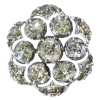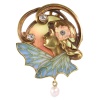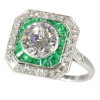We offer layaway, spread payments on the piece of your dreams. Ask us for details. Free insured shipping on all orders !!!

Antique jewelry glossary
Welcome to our extensive antique jewelry glossary with around 1,500 jewelry related entries.If you feel you are missing an explanation, feel free to let us know and we will add it.
A - B - C - D - E - F - G - H - I - J - K - L - M - N - O - P - Q - R - S - T - U - V - W - X - Y - Z all
The Twelve Apostles' stones

See our: religious jewelry.
The Twelve Apostles (Greek: "apostolos" or "someone sent out", e.g. with a message or as a delegate) were, according to the Synoptic Gospels (i.e., the Gospels of Matthew, Mark and Luke) and Christian tradition, disciples (followers) whom Jesus of Nazareth had chosen, named, and trained in order to send them on a specific mission. After the Apostle Judas Iscariot had betrayed Jesus, the remaining Apostles under the leadership of Simon Peter filled the vacancy by electing by lot Matthias, a companion of theirs ever since they themselves had followed Jesus, so that by the time of the coming of the Holy Spirit at Pentecost they actually numbered twelve again.
Saint Peter
- attributed stone: jasper (also called bloodstone)
- antique jewelry with jasper / bloodstone
- patronage: bakers, bridge builders, butchers, fishermen, harvesters, cordwainers, horologists, locksmiths, cobblers, masons, net makers, the Papacy, shipwrights
- called for aid in: frenzy, foot problems, fever, longevity
Renamed by Jesus, his original name was Simon (Mark 3:16); was a fisherman from the Bethsaida "of Galilee" (John 1:44, cf. John 12:21). Also known as Simon bar Jonah, Simon bar Jochanan (Aram.), Cephas (Aram.), and Simon Peter.
The Apostle Peter, also known as Saint Peter (from the Greek Petros, meaning "rock"), Shimon "Keipha" Ben-Yonah/Bar-Yonah, Simon Peter, Cephas and Keipha (Keipha and Cephas also mean rock)original name Shimon or Simeon (Acts 15:14)was one of the Twelve Apostles whom Jesus chose as his original disciples. His life is prominently featured in the New Testament Gospels and the Acts of the Apostles. Peter was a Galilean fisherman assigned a leadership role by Jesus (Matthew 16:18; John 21:1516). Many within the early Church, such as St. Irenaeus, assert his primacy among the apostles. (from: Wikipedia)
Saint Andrew
- attributed stone: sapphire
- antique jewelry with sapphire
- patronage: army rangers, mariners, fishermen, fishmongers, rope-makers, singers and performers
Saint Andrew (Greek: Andreas), called in the Orthodox tradition Protocletos, or the First-called, is a Christian Apostle and the younger brother of Saint Peter. The name "Andrew" (from Greek : Andreia, manhood, or valour), like other Greek names, appears to have been common among the Jews from the second or third century B.C. No Hebrew or Aramaic name is recorded for him. The New Testament records that St Andrew was a son of Jonah, or John, (Matthew 16:17; John 1:42). He was born in Bethsaida on the Sea of Galilee (John 1:44). Both he and his brother Peter were fishermen by trade, hence the tradition that Jesus called them to be his disciples by saying that He will make them "fishers of men" (Greek: halieis anthropon). At the beginning of Jesus' public life they occupied the same house at Capernaum (Mark 1:21-29). (from: Wikipedia)
Saint James
- attributed stone: chalcedony
- antique jewelry with chalcedony
- patronage: veterinarians, equestrians, furriers, tanners, pharmacists
Saint James, son of Zebedee (d. AD 44) or Yaakov Ben-Zebdi/Bar-Zebdi, was one of the disciples of Jesus. He was the son of Zebedee and Salome and brother of John the Evangelist. He is called Saint James the Greater to distinguish him from the other apostle named James (James, son of Alphaeus) (also known as James the Lesser). James is described as one of the first disciples to join Jesus. The Synoptic Gospels state that James and John were with their father by the seashore when Jesus called them to follow him. According to Mark, James and John were called Boanerges, or the "Sons of Thunder". James was one of only three apostles whom Jesus selected to bear witness to his Transfiguration. The Acts of the Apostles 12:1-2 records that King Herod had James executed by sword, making him the first of the Twelve Apostles to be martyred. (from: Wikipedia)
Saint John
- attributed stone: emerald
- antique jewelry with emerald
- patronage: authors, theologians, publishers, booksellers, editors and painters
- called for aid in: burns, poisoning, friendships
Saint John the Apostle was one of the Twelve Apostles of Jesus. Christian tradition identifies him as the author of several New Testament works: the Gospel of John, the Epistles of John and the Book of Revelation. (from: Wikipedia)
Saint Philip
- attributed stone: sardonyx
- antique jewelry with sardonyx
- patronage: hatters and pastry chefs
Saint Philip was one of the Twelve Apostles of Jesus. Later Christian traditions describe Philip as the apostle who proselytized in Greece, Syria, and Phrygia. He was martyred by crucifixion in the city of Hierapolis. In the Roman Catholic Church, the feast day of Saint Philip, along with that of Saint James, has traditionally been observed on May 1, but was moved to May 11, the next free day, in 1955 due to the addition of the feast of Saint Joseph the Workman. In 1970, with the suppression of many feasts during the revision of the calendar, it was placed on May 3. Members of the Eastern Orthodox Church celebrate St Philip's feast on November 14. Many churches within the Anglican Communion continue to celebrate it on May 1. In addition, many Traditional Roman Catholics continue to celebrate the feast day of Saints Philip and James, Apostles on May 1 as a Double of the 2nd Class feast (see the General Roman Calendar as in 1954).
Gnostic Christians appealed to the apostolic authority of Philip, ascribing a number of gnostic texts to him, most notably the Gospel of Philip from the Nag Hammadi library. St Philip the Apostle is not to be confused with Philip the Evangelist and Protodeacon from the Book of Acts. (from: Wikipedia)
Saint Bartholomew
- attributed stone: sard
- antique jewelry with sard
- patronage: bookbinders, butchers, cobblers, Florentine cheese merchants, Florentine salt merchants, leather workers, plasterers, shoemakers, tanners, trappers and whiteners
- called for aid in: nervous diseases, neurological diseases and twitching
Bartholomew was one of the twelve Apostles of Jesus. Bartholomew (Greek transliterated "Bartholomaios") comes from the Aramaic bar-Tôlmay, meaning son of Tolmay (Ptolemy) or son of the furrows (perhaps a ploughman). Many have, based on this meaning, assumed it was not a given name, but a family name.
The festival of St. Bartholomew is celebrated on August 24 in the western Church and on June 11 in the Eastern churches. The Armenian Apostolic Church honours Saint Bartholomew, along with Saint Thaddeus as their patron saint. The Coptic Church remembers him on January 1. The festival in August has been a traditional occasion for markets and fairs; such a fair serves as the scene for Bartholomew Fair, a play by Ben Jonson. (from: Wikipedia)
Saint Matthew
- attributed stone: chrysolite
- antique jewelry with chrysolite
- patronage: accountants
Matthew the Evangelist ("Gift of the LORD", Standard Hebrew and Tiberian Hebrew: Mattay or Mattiyahu; Greek: Matthaios), most often called Saint Matthew, is a Christian figure, and one of Jesus' Twelve Apostles. He is credited by tradition with writing the Gospel of Matthew, and is identified in that gospel as being the same person as Levi the publican (tax collector). (from: Wikipedia)
Saint Thomas
- attributed stone: beryl
- antique jewelry with beryl
- patronage: architects
Saint Thomas the Apostle, Judas Thomas or Didymus, was one of the Twelve Apostles of Jesus. The Synoptic Gospels and Acts list this "twin" (Te'oma means twin in Aramaic, as does Didymus in Greek) among the apostles (Matthew 10:3, Mark 3:18, Luke 6:15). (from: Wikipedia)
Saint James the Less
- attributed stone: topaz
- antique jewelry with topaz
- patronage: apothecaries, druggists, fullers, hatmakers, hatters, milliners and pharmacists
- called in for aid with: dying people
James, son of Alphaeus was one of the Twelve Apostles of Jesus of Nazareth. He is generally identified with James the Less, and is more commonly known by that name in church tradition. St James, the son of Alphaeus is rarely mentioned in the New Testament, but he is sometimes identified with James the Just, an important leader in the New Testament church. He is clearly distinguished from James, son of Zebedee, another one of the Twelve Apostles. (from: Wikipedia)
Saint Jude
- attributed stone: chrysoprase
- antique jewelry with chrysoprase
- patronage: hospitals
- called for aid in: lost causes, desperate situations
Saint Jude (or Judas) is a Christian saint identified as both Jude of James and Thaddeus(N27) in the New Testament. He is also called Lebbaeus, Thaddaeus, or Judas Thaddaeus. Though both bear the same first name in the Greek original New Testament, Jude should not be confused with Judas Iscariot, another disciple and later the betrayer of Jesus. Their name is a Greek variant of Judah and was common among Jews at the time.
The Armenian Apostolic Church honours Thaddeus along with Saint Bartholomew as her patron saints. In the Roman Catholic Church he is the patron saint of desperate cases and lost causes. Saint Jude's attribute is a club. He is also often shown in icons with a flame around his head. This represents his presence at Pentecost, when he received the Holy Spirit with the other apostles. He is shown with a flame around his head because he is the patron of lost causes and can perform some great miracles for the hopeless. He is shown with this because just as the Holy Spirit performs miracles, St. Jude performs them as well. Occasionally he is represented holding an axe or halberd, as he was brought to death by one of these weapons. In some instances he may be shown with a scroll or a book (the Epistle of Jude) or holding a carpenter's rule. (from: Wikipedia)
Saint Simon
Simon the Zealot
- attributed stone: hyacint
- antique jewelry with hyacinth
- patronage: curriers, sawyers, tanners
The apostle called Simon Zelotes, Simon the Zealot, in Luke 6:15 and Acts 1:13; and Simon Kananaios ("Simon" signifying "hearkening; listening"), was one of the most obscure among the apostles of Jesus. Little is recorded of him aside from his name, few pseudepigraphical writings were connected to him, and Jerome does not include him in De viris illustribus. The name of Simon occurs in all the passages of the synoptic gospels and Acts that give a list of apostles, without further details.
Simon, whom he named Peter, and Andrew his brother, and James and John, and Philip, and Bartholomew, and Matthew, and Thomas, and James the son of Alphaeus, and Simon who was called the Zealot, and Judas ["the son" is interpolated] of James, and Judas Iscariot, who became a traitor. (Luke 6:12-16, RSV) To distinguish him from Simon Peter, he is called Kananaios, or Kananites (Matthew 10:4; Mark 3:18), and in the list of apostles in Luke 6:15, repeated in Acts 1:13, Zelotes, the "Zealot". Both titles derive from the Hebrew word qana, meaning The Zealous, though Jerome and others mistook the word to signify the apostle was from the town of Cana (in which case his epithet would have been "Kanaios") or even from the region of Canaan. As such, the translation of the word as "the Cananite" or "the Canaanite" is purely traditional and without contemporary extra-canonic parallel. (from: Wikipedia)
Judas Iscariot
- attributed stone: amethyst
- antique jewelry with amethyst
Judas Iscariot (died April AD 2933) was, according to the New Testament, one of the twelve original apostles of Jesus. Among the twelve, he was apparently designated to keep account of the "money bag", but he is most traditionally known for his role in Jesus' betrayal into the hands of Roman authorities. His name is also associated with a Gnostic gospel, the Gospel of Judas, that exists in an early fourth century Coptic text. Judas has been a figure of great interest to esoteric groups, such as many Gnostic sects, and has also been the subject of many philosophical writings.
Most modern Christians, whether laity, clergy, or theologians, still consider Judas a traitor. Indeed the term Judas has entered many languages as a synonym for betrayer, and Judas has become the archetype of the betrayer in Western art and literature. However, some scholars have embraced alternative notions that Judas was merely the negotiator in a prearranged prisoner exchange that gave Jesus to the Roman authorities by mutual agreement or acted with Jesus' knowledge and consent to ensure the re-enactment of Biblical prophecy, and that his later portrayal as "traitor" was a historical distortion. (from: Wikipedia)
For more information on: precious stones and their various adjudgements.









